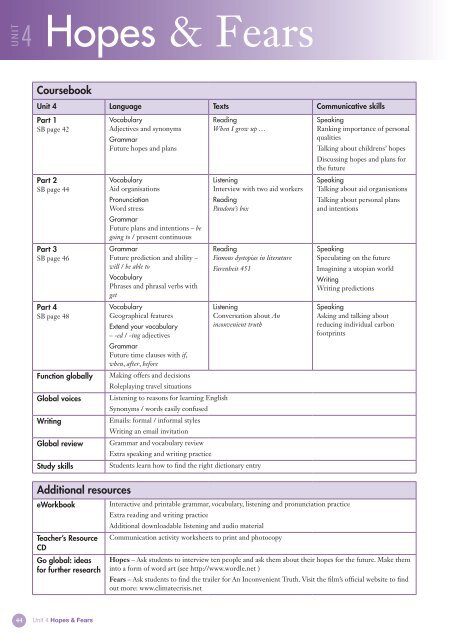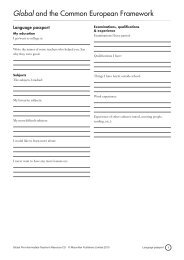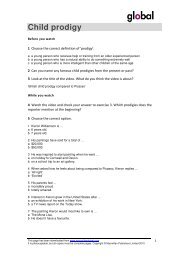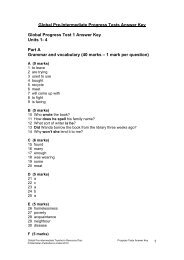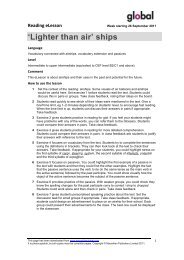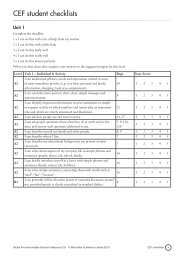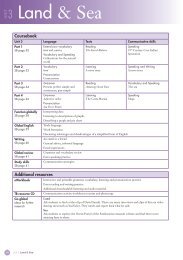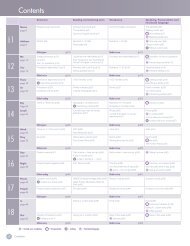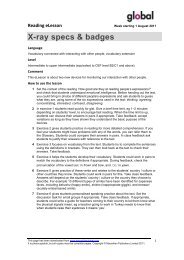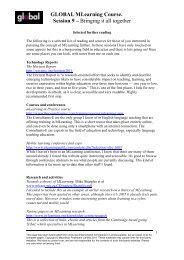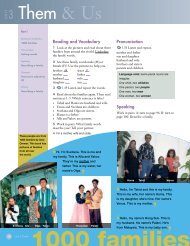Teacher's Book teaching notes - Global
Teacher's Book teaching notes - Global
Teacher's Book teaching notes - Global
You also want an ePaper? Increase the reach of your titles
YUMPU automatically turns print PDFs into web optimized ePapers that Google loves.
UNIT4Hopes & FearsPart 1TEACH globalThink localLead-inTell students about someone who you really admire and why.Students do the same for themselves – give thinking timeand allow them to make <strong>notes</strong>. Students talk in threes. Takebrief class feedback and ask students to give reasons fortheir choice – did they choose X because of their personality,talent, money, good-looks? This requires students to considertheir personal values and links to the next stage.Vocabulary (SB page 42)1 Refer back to the reading on Dorian Gray page 33.Students tell each other in pairs what they can rememberabout the extract and the novel. Remind students that hemade the choice to stay young and good-looking overeverything else.Students read the phrases in exercise 1 and work alone toorder the qualities in order of importance.TEACH globalThink localMixed abilityAdd extra phrases on the board, giving students time to thinkwhere they would position these in order of importance: beinghappy with yourself; living in a nice,comfortable home; havinggood friends; having a loving family; having a secure jobAfter comparing answers, invite class feedback. Askstudents to try and justify their responses if they feelable to.2 First ask students to quickly look through theadjectives in the box and to tell you how many words arenew to them. If there are four new ones or more, thenelicit / clarify the meaning, so that the task is manageable.Drill the students on the new items.Pronunciation noteNote the schwa, eg /ˈeksələnt/, /ˈklevə/, /ˈhænsəm/,/ˈwʌndəfəl/, /ˈɔːfəl/. You could also highlight the silent ‘d’ in‘handsome’ and the pronunciation of the first vowel in ‘awful’.being good-looking: beautiful, handsome.being intelligent: clever, smart.being rich: wealthy, well-off.having good health: wonderful, excellent.Language noteHandsome is usually used for (adult) men, or for women witha strong face. Beautiful is usually used for women and youngchildren. Good-looking is typically used for adult men andwomen. In spoken English, good-looking is more usual thanhandsome for describing men.3 Elicit the answer as a whole class.Extra words: awful, terriblesynonym: bad4 Ask students: Do the things you want from life change asyou get older? How? Give students a personal example toshow how your own priorities have changed / will change,putting the examples on the board, using the targetphrases suggested.Students do exercise 4. Monitor and assist as students arewriting. Students then compare ideas with a partner. Pickup on any areas of interest as a whole class.Reading (SB page 42)This text is a random collection of thoughts about thefuture, expressed by young children.1 Ask students to look at the pictures and tell them theyare going to read about different children’s hopes, givenin a survey.Elicit some suggestions about the kind of hopes thesechildren might have. Ask students to read the statementsand make a choice of a, b or c. Take whole class feedback.cTEACH globalThink localMixed abilityFor less strong students, ask them to provide examples fromthe text of a) and b). In pairs they write down at least threeexamples for each category.2 Students re-read the text and choose the two mostinteresting quotes. At this stage, help individual studentswith any vocabulary queries. Students compare choices inpairs.3 Students work in pairs or threes to discuss thequestions. Provide an additional question for earlyfinishers: What age do you think the children in the surveywere and how do you know?TEACH globalThink localReading extraAsk students to look back at the text and decide what thehope tells us about the child; his/her fears; his/her situation,eg I’d like to have less pollution in my city – she might live in avery crowded city; I’d like my dad to understand me one day– he probably has a poor relationship with his father. Studentschoose four examples that they think are interesting. Theywill be using modals such as might, may or must; adverbialssuch as maybe or perhaps, or simply verb phrases such as wethink … . Highlight these either before or after the activity, asappropriate.Hopes & Fears Unit 4 45
UNIT4Hopes & FearsGrammar (SB page 43)1 Students work in pairs to try to remember as many ofthe children’s hopes for the future as possible. First elicitan example and make sure students use full sentences andtalk in the first person, eg I want to have a nice house.As they talk, write up any of the target language they useon the whiteboard in full sentences, eg I hope to …; I wantto … . At the end, highlight the target phrases.Refer students to the Grammar examples andinformation. Clarify the word ‘definite’ if necessary.Then students complete exercise 1 alone, writing theexamples down. Monitor and assist, referring studentsback to the Grammar rules. Students compare sentences.1 I hope to get a good job.2 I’m going to get a good job.3 I’m looking forward to getting a good job.4 I’m planning to get a good job.5 I want to get a good job.6 I would like to get a good job.TEACH globalThink localExtra activityAs a preparation for the text in exercise 2, dictate these:a More English boys than girls hope to pass their driving testwhen young.b More boys than girls are looking forward to having children.c All children say they want to live in a peaceful world.d Only a small number of children think of the developingworld.Students decide in pairs if these are true or false beforereading.(a T b F c F d F)2 This text summarises findings from research in whichschoolchildren were questioned about their future.Ask students to work alone initially.1 to go2 to get3 to pass4 having5 to have6 living7 to getG Grammar focusShow students the icon. Write page 138 on the board andask them to find it. Show students the language summaryon future hopes and plans.You can use exercise 1 on page 139 for:a) extra practice nowb) homeworkc) review a couple of lessons from now.The answers are on page 142 of the Teacher’s <strong>Book</strong>.TEACH globalThink localExtra activityThis exercise focuses on ways to talk about numbers andstatistics. Write the following on the board. Elicit the fullphrases. Note that only some of them are in the text inexercise 2:a T m o the children hopeto go to university or college.(the majority of)b M o the children were optimistic.(most of)c A s n (of …) were pessimistic.(a small number)d A f (a few) were pessimistic.Students work in pairs to use the phrases to describe theirclassmates, eg a large number of students come to Englishclasses on foot.Speaking (SB page 43)1 First ask students to look at the list in the box andto select two areas for you their teacher to talk about.By discussing the ideas that they choose, this serves as amodel. Give students two minutes to choose three ideasfor themselves and think about what to say.2 and 3Pair students. Tell them that the listener should ask atleast one question after each idea. Students need to keeptalking until you make a signal, eg ring a bell or clap.Wait at least thirty seconds in each case. As students talk,monitor and focus on accuracy of the target language,noting details for later.TEACH globalThink localExtra activityWrite the names of different people familiar to your studentson separate pieces of paper, eg Usain Bolt (the fastest male100m and 200m runner). Give each pair two different names.They write at least three hopes that each person might havefor a) the immediate future b) the longer-term future, eg forBolt a) I’m looking forward to the Olympic Games. b) I’d liketo be a good example to young black Americans. Write upthe different names on the board. Students then read outtheir secret person’s hopes and see if others can guess theirperson.46Unit 4 Hopes & Fears
UNIT4Hopes & FearsPart 2Speaking and Listening (SB page 44)TEACH globalThink localLead-inTo stimulate interest and to introduce the word ‘aid’, showstudents pictures by doing an image search on the web usingthe key words: aid organisations, or charity names such asOxfam or Save the Children. Discuss as a class: What dothese organisations do? Where do they work? How do theyraise money?This listening is an interview with two aid workersdiscussing their next post.1 Students look at the graph and discuss the questions inpairs.Helle:Josh:Helle:Interviewer:Josh:Helle:Interviewer:Josh:Helle:I fell in love with Guatemala when I was thereon a holiday two years ago. The peopleare friendly and the country is beautiful. Iremember thinking: “I’m coming back here oneday.”It’s going to be my first time in Guatemala. I’mlooking forward to going on this trip very much.Yeah, me too.Good question. I guess I would say that hopeis the most important thing. If you don’t havehope, you don’t have anything.Yes, this is especially true when you’re workingwith people who have, really, lost hope. If youhave hope, well that helps you keep going.Thanks. We’ll let you know how it goes.Thank you.2 1.48 To help students get a more globalunderstanding first, write these two questions on theboard: Do you think Josh and Helle’s new job with an aidorganisation sounds a) difficult b) a positive or negativeexperience? (it sounds quite difficult, but a positiveexperience).Then ask students to listen again to order theinterviewer’s questions / comments in exercise 2.1 So, tell us about yourselves.2 What are you going to do there?3 How did you become aid workers?4 What is the most important thing in your job?5 Thanks for your time.1.48Interviewer:Josh:Helle:Josh:Helle:Josh:Helle:Interviewer:Helle:Josh:Helle:Interviewer:Josh:OK, well. My name’s Josh Gross and this isHelle Hansen.Hi.And … well, we’re aid workers with the Danishorganisation Milene Nielsen Foundation. Helle,do you want to … say something about it?It’s starting a new project in Guatemala nextmonth. We’re going to be in a small village …In the mountains.In the mountains. It’s a very poor place.We’re going to work with the children there.Basically, we’re going to be responsible for thechildren during the day. Playing, cooking …Cleaning …I’m a teacher originally, and Helle has abackground in child psychology. We bothwanted to help people.3 Students work in pairs to share suggestions about thesewords before they listen again.The aid organisation is Danish.Guatemala is where they are going to do volunteer work.Helle came to Guatemala on holiday two years ago.They are starting a project in a village.4 Put students in groups of three to answer the questionand think of any positive or negative aspects of the job.After the discussion, ask for feedback open class. (Possiblesuggestions are: Positive – job satisfaction; an interestingexperience; the chance to improve things; usually shortterm contracts; good team work; probably nice, like-mindedcolleagues. Negative – difficult living conditions; poor pay;frustrating because of insufficient money/politics; being anoutsider; living away from family / friends.)Finally, ask students again whether they would like to dosuch a job and why / why not.TEACH globalThink localListening extraStudents look at the audioscript and find examples of thetarget language for plans and hopes, eg I’m going to …Vocabulary and Pronunciation(SB page 44)1 Ask students to work in pairs to complete exercise 1and then check any words in a monolingual dictionary.Hopes & Fears Unit 4 47
UNIT4Hopes & FearsTEACH globalThink localMixed abilityEarly finishers work on word families in pairs: predicting theadjective (except for war and natural disaster). Studentswork together and then check their predictions with you / thedictionary. Encourage students to make logical guesses, eg toadd ‘ed’ or ‘ful’ suffixes.disease 4homelessness 2hunger 3natural disasters 6pollution 7poverty 1war 52 Ask students how many syllables are in ‘war’ and‘natural’ and show on the board how to represent wordstress with small and large circles. Then ask them tocomplete the chart by writing a word on each line. Letstudents compare answers in pairs.3 1.49 Students listen to the words and check thestress, then repeat each word after the recording.1.49war Onatural Oohunger Oodisease oOpoverty Ooohomelessness Ooodisasters oOopollution oOoTEACH globalThink localHomework extraAsk students to re-read the audioscript of the interview withHelle and Josh. Imagine that the interviewer then asked: Can Iask why you both became aid workers? What are the negativeand positive sides to the job? What’s the hardest thing aboutyour job? Students continue the interview. Give a minimumword count, eg 80 words.Grammar (SB page 45)1 Ask students to remember at least five facts from thelistening about the aid workers, eg they worked for aDanish organisation.Write up these two gapped sentences and elicit themissing words:We work with the children. (are going to)The organisation a new project in Guatemala.(is starting)Elicit the meaning of the target structures by askingconcept questions, eg going to: When did they decide?Just now or some time ago? and present continuous: Is this apossibility, or is this sure? Has the organisation already madearrangements?Let students read the information under Grammar.Language noteThe two structures are sometimes interchangeable in use.They are both used for future plans, but where the situationis more fixed, the present continuous tends to be used, egwhere you know details such as when, who with, where.When talking about plans which you have limited controlover and do not know the details of, it is unnatural to use thepresent continuous: I’m buying a big house when I’m older.See example 3, exercise 2, SB page 45.Typically students at this level prefer to use ‘will’ or possibly‘going to’. Students sometimes find it hard to use presentcontinuous for future reference, having initially learnt it for thepresent (see Unit 1).Students complete this exercise alone first, then compareanswers in pairs. In feedback, zoom in on the presentcontinuous example: the organisation is starting a projectnext month. Ask students why this is in the presentcontinuous, asking concept questions, eg Is it certain?Where? Do they know exactly where in this country? When?1 Incorrect – is starting2 Incorrect – is going to work3 Correct4 Correct5 Incorrect – It’s going to be2 Ask students to choose the correct form to completeeach question. Elicit the first one as an example,reminding students that sometimes both options arepossible. Then students work individually.If students need help with the question form, elicit theforms onto the board.1 are you doing2 Are you going3 Are you going to read4 Are you working5 Are you going to study3 Ask students to ask you the questions first, and focus inon the features of natural speech, eg contractions, linkingand the schwa (see Language note below). Then pairswork together.G Grammar focusShow students the icon. Write page 138 on the board andask them to find it. Show students the language summaryon future plans and intentions.You can use exercises 1 and 2 on page 139 for:a) extra practice nowb) homeworkc) review a couple of lessons from now.The answers are on page 142 of the Teacher’s <strong>Book</strong>.48Unit 4 Hopes & Fears
UNIT4Hopes & FearsLanguage noteIn terms of pronunciation, the auxiliaries are reduced orcontracted in fluid speech, eg They’re going to work with thechildren there.What are /ə/ you going to do after class?‘Going to’ becomes: /gəʊɪŋtə/, or even /gənə/ with the ‘to’pronounced as a weak form.In exercise 2, SB page 45, in the short answer ‘meeting afriend’ the subject and auxiliary are omitted via ellipsis, acommon feature of spoken English. Learners tend to givea full answer where fluent speakers might not. You couldhighlight this to students.Reading and Speaking (SB page 45)This is a text summarising the story of Pandora’s boxfrom ancient Greek mythology. Your approach to this textwill depend on how much your students already know.Put the words Pandora’s box on the board and see ifstudents know anything about this story, pointing to thepicture. Pre-teach trouble (in the text trouble is similar toproblem) and despair.Write these questions on the board for students to answeron a first reading: What was Pandora’s box? What was theone trouble she did not let out? Was this a good thing? Why /why not? How do you think people felt when she changed hermind? Check these open class.Students then discuss the three more general questions inpairs.Background noteGreek myths are the stories of the Ancient Greeks and theyare about heroes, gods, mythological creatures, the world andculture. This myth of Pandora is mentioned in many differentstories and is interpreted in different ways. It tries to give oneexplanation as to why evil exists.Hope was considered to be negative by the Greeks: it givesyou the false idea that you can control the future and does notlet you live properly as it distracts you from the present.Part 3TEACH globalThink localMixed abilityThis unit focuses on will for future predictions. Decide ifyour particular students would benefit from having a breakbetween this and the work on the present continuous / goingto in this unit, or if they are ready to cope with this focus now.TEACH globalThink localLead-inThis activity will work best if students have the same orsimilar backgrounds. Put authors’ first and last names on twoseparate pieces of paper, eg William + Shakespeare; Leo +Tolstoy, choosing writers your students will be familiar with.Give out the halves of the names to different students. Theymingle to find their other half, then together try to name anyworks written by the author. They may need help from you totranslate their titles into English. Take whole class feedback.Reading (SB page 46)The three texts are summaries of the three novels, 1984,Brave New World, and A Handmaid’s Tale.1 Students work alone and write down three titles ofnovels or plays that they studied at school. Discuss inthrees a) what sort of books they were b) briefly what theywere about and c) if they liked studying them.Then students continue the discussion by talking aboutthe two points in exercise 1. Take some whole classfeedback on points of interest.2 Elicit any details that students know about the threebooks on page 46 or their film adaptations. If possibleshow the film posters, by doing a web search and typingin the name of the book, and then film.Tell students that the books all have similar themes, asthey are all ‘dystopias’, referring them to the glossary onSB page 46.3 1.50 The three texts are summaries of the threenovels, and all describe oppressive regimes.Pre-teach the words ‘government’ and ‘control’ fromstatement b, exercise 3.Students complete the reading task and compare answersin pairs.a tickb tickc –d –Hopes & Fears Unit 4 49
UNIT4Hopes & Fears4 First of all, write these words on the board and letstudents discuss the meaning in groups of three: enemy(n), nuclear accident / disaster (n), pregnant (adj); slave(n) and factory (n). If necessary, let students refer todictionaries.Check understanding by asking concept questions, egHow long are women usually ‘pregnant’ for? What happensin a ‘nuclear disaster’? What sort of things are made in a‘factory’?Remind students that they do not need to understandevery word to complete the comprehension task.Monitor closely to see how challenging they find the task.Students compare answers in pairs.When taking class feedback, ask students to refer tospecific lines from the summaries to support theiranswers.1 HT (many women are infertile – line 4)2 1984 (line 3)3 HT (nuclear accident – line 3)4 BNW (people don’t know war – line 2)5 BNW (create babies in factories – line 5)6 1984 (even people’s thoughts – line 6)7 1984 (fall in love – a crime – line 9)8 BNW (line 3)5 Divide students into pairs and elicit their reaction tostatement 1 in exercise 4, referring them to the Usefulphrases box.Monitor and note down any linguistic points that youwould like to highlight afterwards.Take whole class feedback and pick up on any interestingviews or comments.Background note1984 was written in 1948. It has political, social and sexualthemes. The book has an anti-totalitarianism message and isin many ways a description of post-war Britain. The novel hasbeen translated into 62 different languages.Brave New World was written in 1932. Huxley gave afrightening view of the future, when other novels weredescribing ‘utopias’. Huxley was describing the fear of losingone’s individual identity in an increasingly scientific world.A Handmaid’s Tale was written in 1985. Atwood was heavilyinfluenced by Orwell. It explores the themes of women,politics and power and though frequently a school text, isconsidered by many to be anti-religious and over-explicitsexually.All of these novels have been adapted for the cinema, TV,radio and stage.TEACH globalThink localReading extraTo focus students on prepositions, write the following on theboard:a The novel is setthe future, in London. (in)b Winston worksthe government. (for)c He is getting tiredlife. (of)d They falllove. (in)e Adults are dividedfive social groups. (into)f He has to choose joining them or dying.(between)g Offred learnsan underground resistancegroup. (about)Students fill in the gaps alone, without looking at the texts.Check answers.Students close their books and test each other in pairs,making sure that the student being tested does not seethe board. The other reads the first half of each sentenceup to the preposition, eg The novel is set … . Their partnercompletes the sentence from memory, using the correctpreposition. Swap roles and repeat. Encourage students torecord the new language.Grammar (SB page 47)Using your fingers to represent each word, elicit themissing words in these two sentences, taken from theGrammar section:Thereonly 3 countries in the world.Womenhave babies. Ask students concept questions: Isthis talking about the present or future? (Future);Are they talking about plans? (No); What are these?(Predictions).Students read the two bullet points about usage underGrammar.Language noteStudents often find the different choices of future formsconfusing. Indeed, in many languages there is only one formused to convey the notion of futurity.Will has many different uses as it is a modal auxiliary verb,but is often seen by learners as ‘the future tense’, leading tounnatural sentences such as: I’m sorry I can’t come, I will goto the dentist this afternoon. Usually the choice is determinedby the context and the speaker’s perception of the event, egShe’s going to bake a cake.This is a plan.She’ll make a cake.This could be a prediction (based on knowledge of herbehaviour), a warning, a promise, etc. These functionalheadings often help learners to understand ‘will’.Pronunciation noteWill is usually contracted to ’ll, the so-called ‘dark l’ whichlearners find difficult to hear or produce, so drilling this mayhelp.50Unit 4 Hopes & Fears
UNIT4Hopes & Fears1 Do the first example together (The government willcontrol society through the media), then students work alone.This is a transformation exercise: the aim is to focus onmanipulation of form rather than focusing on meaning.People won’t be able to read or own books.The population will get all their information from thetelevision.They won’t know their history.Firemen won’t stop fires, they will start them.Background noteFahrenheit 451 was first published in 1953 and wasBradbury’s most popular novel. The novel is a critique ofAmerican society. It describes a world where people live forpleasure, one where reading is forbidden. Bradbury felt thattelevision destroys literature. 451 degrees fahrenheit is thetemperature at which a book starts to burn independently. Thebook has been made into a film.2 Ask students if they know the word which means theopposite of dystopia. Write utopia on the board and try toelicit what this might be. Let them read the definition intheir books.Elicit a couple of examples from students and then letthem work on their five predictions in pairs. If necessary,put some prompts on the board: family life; health; work;lifestyle; money; happiness, food, travel etc.Then re-group students into fours, and let them decideon the six best ideas.Let students read other groups’ ideas at the end, bysticking the lists up around the room. Finally, they shouldvote for the best utopia.G Grammar focusShow students the icon. Write page 138 on the board andask them to find it. Show students the language summaryon prediction and ability.You can use exercises 1 and 2 on page 139 for:a) extra practice nowb) homeworkc) review a couple of lessons from now.The answers are on page 142 of the Teacher’s <strong>Book</strong>.Vocabulary (SB page 47)1 Tell students that they are going to look at one of themost common words in the English language: one of thetop five most commonly used verbs. Students guess whatit is (top five: be, have, do, say, get).Students read exercise 1 and complete the table. Thenencourage students to think of other examples to add tothe list if possible, as a class, eg become: get angry, gethungry, get sick; receive: get the post, get his present;arrive: get to your destination, get home.become: getting tired; get pregnant; get interestedreceive: get their informationarrive: get toTEACH globalThink localAlternative procedureThis approach contextualises the target lexis. Draw a stickfigure of a man called Charlie, with a sad face. Tell the storyabout him. Every time you pause, elicit suggestions silently(raise eyebrows / use a hand gesture, etc, to signal). It doesnot matter if students do not give the correct suggestions.Charlie was very, very bored with his life. He wanted to getaway from his humdrum life, his job as a (pause) … bankclerk, dealing with difficult customers and non-stop counting.He had no (pause) …. fun any more. That night, he decidedto change his life. He (pause) … packed his (pause) … bagand had an early night. In the morning he (pause) … got upwith the birds and set out on a round the world trip. After twoweeks of getting around mainly on foot, he had only travelledabout 150 km and he felt very (pause) …. tired. He realisedthat he was actually missing even his (pause) … job! Thatnight, when sleeping in a cheap hotel, all his things – his bagsand his money – (pause) … were stolen. He decided to (pause)… return home. When he got back, he got together with(pause) … some old friends in the local pub. He also started totalk to the pretty (pause) … barmaid. He decided that (pause)… his life back home wasn’t so bad after all!Re-read the text without pausing. Students re-tell the story inpairs. Then elicit the target phrases with ‘get’, eg He wantedto … .2 If you did not use the alternative procedure above,put the words on the right in exercise 2 on the board, egreturn (v). Students in pairs try to think of a synonym withget for each of the five verbs, then complete the exercise.1 b2 d3 a4 e5 c3 Clarify the situation: this is a perfect world. Ask thefirst two questions to confident students. Give a minute’sthinking time. Ask students to work in pairs to ask andanswer the questions.TEACH globalThink localHomework extraStudents write a single diary entry, from a utopian world.Start like this (put on the board and elicit ideas): I woke upat 9.30 am, with the sun shining through the window ontomy(describe) bed. I got up and hadfor breakfast (what?), then went to(place) to(why?). Students continue it.Hopes & Fears Unit 4 51
UNIT4Hopes & FearsPart 4TEACH globalThink localLead-inBefore class do an image search online with the key words:polar bear and coral reefs and show students selectedimages. Elicit why we should be worried: the polar bear’shabitat / survival is threatened by melting ice; 60% of theworld’s coral is predicted to have died by 2030, due largely towarming waters. Elicit the global problem: climate change orglobal warming. Write these up on the board. Ask students ifthey can give other examples of climate change.Vocabulary (SB page 48)1 Students complete the missing words, alone initially,without a dictionary. Then they work together in pairs.2 1.51 Ask students to listen and check their answers,then repeat the words after the recording. Drill any trickywords, eg flood /flʌd/, ocean /ˈəʊʃən/ and desert /ˈdezət/.1.511 Europe – stronger storms and increased chance of floods2 Africa – lakes and rivers disappearing3 New Zealand – oceans getting warmer4 Mexico, US – Numerous forest fires5 Africa – Area of desert increasing6 Greenland – Glacial ice meltingDo a web search using the key words: An InconvenientTruth film or go to www.climatecrisis.netThe film is about future problems related to globalwarming.1.521: An Inconvenient Truth? Isn’t that a documentary from afew years ago about global warming? No. I haven’t seen it,no. I heard it was interesting.2: Well, of course I knew about global warming a bit beforeI saw the film … but, well …. wow. I mean, it really makesme think about what I’m going to do. If we don’t dosomething now, we’ll have serious problems in the future.3: All I want to say is that I saw this film. It was a greatdocumentary, and it’s very very important.4: Oh, yes I remember this film. I saw it after Al Gore won theNobel peace prize. I learned a lot. It was different from ausual Hollywood film.5: I didn’t like it. These kinds of documentary films arealways frightening. And anyway, when this climate changehappens, I’ll be dead. So I don’t want to worry about itnow.6: I haven’t, but my son saw this film at school, in hisgeography class. He was talking about it all evening. Hesaid: “You’ll think differently after you see it.” I think it’sgood that he learns about this kind of thing at school.3 Give students time to read the statements for eachspeaker first. Write the name Al Gore up, explaining whohe is. Play the recording and monitor – play the recordingtwice at this stage, if necessary.TEACH globalThink localExtra activityStudents compare <strong>notes</strong> before whole-class feedback.Students have a group discussion on climate change. Tellthem you will ask groups for their opinions and comments inseven minutes (give less or more, as appropriate). Studentschoose a representative to take <strong>notes</strong> and report back.Dictate these:Have you felt or seen any signs of climate change yourself?Can you remember any other examples of climate changewhich you have heard of?Are we causing climate change or is it a natural thing?What do you think is going to happen?Listening (SB page 48)This listening comprises different people giving theiropinions about the film and its message.1 Students write down the name of the most terrifyingfilm they have seen, then discuss in threes.Ask students to look at the poster on page 49 and respondto the two questions. Explain this is not a typical ‘horrormovie’.1 F2 F3 TBackground note4 F5 F6 TAlbert Gore (born 1948) is an American politician. He was theVice-President under President Bill Clinton from 1993–2003.He is also a businessman and environmentalist. He wrote AnInconvenient Truth and starred in the Academy-award winningdocumentary based on the book, although some of the claimsmade are not universally accepted. He won the Nobel Peaceprize (2007) for his work on climate change.4 Students respond to the question as a whole class.Encourage students to give reasons. If one of the studentsuses an -ing or -ed adjective, write the sentence on theboard in preparation for the next stage.2 1.52 Students listen and compare ideas in pairsbefore feedback. If you have the technology, you couldalso watch a clip of this film on video sharing websites.52Unit 4 Hopes & Fears
UNIT4Hopes & FearsExtend your vocabulary – -ed /-ingadjectives (SB page 48)Students read the explanation and choose the correctwords individually. Monitor to check that students havegrasped the difference between the two types of adjective.Take feedback.1 boring2 relaxed, surprisedTEACH globalThink localExtra activity3 worryingStudents think of a film / book which made them feel:surprised, tired, interested, bored, amused, excited, scared /frightened, depressed, relaxed (clarify as necessary). Write up:After / while watching / reading / doing X, I felt(adj). It was (a) really(adj) (film, book)Provide an example yourself. Students write three fullsentences about themselves, then compare <strong>notes</strong>.Grammar (SB page 49)1 Elicit an example of the target language first, eg whenI next (go) on-line, I (try )to buy theDVD of An Inconvenient Truth. Check students know ‘mainclause’ versus ‘if/when’ clause – students need this to doexercise 1.As students are completing the gap-fill alone, monitorand note or point out errors relating to form. Take classfeedback and point out the different order of the clausesin 4 (the main clause is first).1 don’t do, will have2 look, will seeLanguage note3 happens, will be4 will think, seeThe ‘if’ clause (subordinate clause) takes a present structureand for students this can seem odd when referring to thefuture. They might say, when I will return home tonight, I’llcook dinner.2 Students work in pairs, both writing full sentences.Monitor.In feedback encourage students to contract the auxiliary,eg If the weather is good tomorrow, I’ll probably go for a walk.If you feel your students could manage, input someexamples of ‘tentative language’ eg I think + I’ll … ; I’llprobably …G Grammar focusShow students the icon. Write page 138 on the board andask them to find it. Show students the language summaryon future time clauses.You can use exercise 1 on page 139 for:a) extra practice nowb) homeworkc) review a couple of lessons from now.The answers are on page 142 of the Teacher’s <strong>Book</strong>.TEACH globalThink localExtra activityWrite the following on the board:1 When / if I meet the love of my life, …2 When / if I become rich, …3 When I retire, …4 When I speak perfect English, …5 When / if I become a successful X, …6 When I pass all my exams, …Students work in twos or threes with a dice. They take it inturns to throw the dice and after each throw, one studentcompletes a correct sentence of that number.Speaking (SB page 49)TEACH globalThink localExtra activityStudents close books. Write the words To stop climatechange, we have to … on the board, eliciting examples beforestudents work in threes to brainstorm more ideas in twominutes. If your students need prompts, write words on theboard eg plastic food packaging; a packet of seeds; a lightbulb;car-keys, a bin, etc. Listen to suggestions as a wholeclass, inviting students to give reasons.1 As a lead-in to the questionnaire, introduce the task,then write up the first question on the board: Elicittwo more possible questions. Students then read the sixquestions and think about their own answers.2 Focus attention on the follow-up question in each case,which should be asked if their partner gives a ‘yes’ answer.Students work in pairs to ask and answer the questions.They should note down their partner’s answers.3 Students may find they still need to ask more detailedquestions to their partner to complete this task.Take whole class feedback to find out who is the mostenvironmentally aware.Background noteYour ‘carbon footprint’ is a measure of the amount you asan individual / group affect global warming and therefore theenvironment. It is a way of conceptualizing the damage we doby measuring the carbon dioxide produced in units.Hopes & Fears Unit 4 53
UNIT4Hopes & FearsFunction globally: makingoffers and decisionsThese lessons in <strong>Global</strong> are designed to provide studentswith immediately useful functional language. They allfollow a similar format.Warm up (SB page 50)Aim: to introduce the topic via a quick speaking task orpicture work.Tips:• Do not over-correct here, especially in speakingactivities.• Encourage students to use what language they can atthis stage.Listening (SB page 50)Aim: to present the functional language in context via aconversation or series of conversations.Tips:• Ask students to read the questions first before listening.• Play the recording all the way through for each task(there are always two tasks).• For multiple conversations pause the audio after eachone.• If students find it very difficult, play the audio a finaltime and allow them to read the audioscript at the backof the book.1 and 2Conversation 1: situation 3. The bill is £2.75Conversation 2: situation 1. His friend is going to drive him.Conversation 3: situation 4. She is going to take the 6.50train.1.53–1.551 A: Oh. Look at the time. My train’s leaving soon.B: Shall I pay for these?A: That would be great.B: OK. Wait. I don’t have enough for both of them.A: Hold on. How much is it?B: 2.75.A: I’ll pay for it. Here’s five. I really have to go nowthough.B: Thanks again. Have a good trip, and see you nextMonday!A: Bye! See you Monday.2 A: Hey! What time do you need to get to the airport?B: I’m planning to be there two hours before the flight.Why?A: Well, look at the time. The airport train leaves in fiveminutes.B: Oh no.A: I’m sorry, we were talking and I didn’t see the time …B: No, don’t worry. I … I won’t take the train. I’ll take ataxi.A: A taxi? They’re quite expensive. Let me drive you tothe airport.B: Really? That would be great. Thanks.A: No problem. We can continue our conversation in thecar.3 A: Can I help you?B: Yes, thanks. Erm, I … I’ve missed my train. Can I usethis ticket for the next train?A: Yes, you can. The next train is the six o’clock fast train.You’ll need to pay an extra ten euros for that. Or youcan take the six fifty train and you don’t have to payanything extra.B: Okay, I’ll take the six fifty train then. Thank you.A: You’re welcome.Language Focus: offers and decisions(SB page 50)Aim: to draw students’ attention to the items offunctional language.Tips:• Make sure students have time to understand the formand meaning of the phrases, but you needn’t translatethem word for word.• Students should be able to pronounce these phrasesintelligibly, so drill them.1 will2 and 31.561 A: Are you ready to order?B: Yes. I’ll have a salad.2 A: I don’t understand this.B: That’s all right. I’ll help you.3 A: The next train is in twenty minutes.B: Shall we take it or wait?4 A: Here, let me take those bags.B: Thanks, but it’s OK. I’ll carry them.Speaking (SB page 50)Aim: to allow students an opportunity to use thislanguage in a meaningful, real-world context.Tips:• There are sometimes a choice of tasks. Any taskinvolving reading a script will be easier than a taskinvolving making students’ own scripts. This gives youflexibility for mixed ability classes.• Give students time to prepare this activity, andcirculate and monitor carefully.• Correct sensitively, paying attention to the targetlanguage especially.• If time allows, ask students to repeat the task, but witha new partner.54Unit 4 Hopes & Fears
UNIT4Hopes & Fears<strong>Global</strong> voicesThese lessons in <strong>Global</strong> are designed to provide studentswith exposure to authentic speakers of English from bothnative and non-native English backgrounds. They allfollow a similar format.Warm up (SB page 51)Aim: to introduce the topic and highlight potentiallydifficult vocabulary the students will encounter.Tips:• Be generous in helping students with the vocabularyhere, but let them try and work it out first.• Circulate and monitor any speaking task, but becareful not to overcorrect.• Follow up any short discussion pairwork with an openclass discussion, asking students to report back whatthey said.2 Other reasons might include: I’d like to travel; I need tospeak English with my relatives / my colleagues; I wantto read English books in the original; my boss has toldme to; I need it to get into university; I love the soundof the language, etc.Listening (SB page 51)Aim: to expose students to English spoken with a varietyof accents.Tips:• The first time students listen, tell them you don’texpect them to understand every word; some of it willbe hard. This is because the text has not been scriptedor graded in any way. It’s what they would hear in “thereal world”.• Pause after each speaker on the second listening, anddon’t be afraid to replay the whole thing if studentsappear to need it.• Students can read the audioscript at the back of thebook if you / they wish.• Try to avoid hunting for specific pronunciation orlanguage errors. In real world communication noteveryone speaks perfect English all the time, not evennative speakers.1.57–1.621 I’m learning English because it will be helpful for mycareer. (5)2 I am learning English because first of all I want to be ateacher of English in my country. (4)3 I would like to work for some companies who work inCanada and USA and they need really good English skillsand I have to speak English very well and to work forthem. (3)4 Well I believe that English is very important nowadaysas you cannot continue studying without using Englishbecause it’s the international language nowadays. (8)5 I am learning English because I love it. I love the Englishculture, the American culture, its movie, its music. (10)6 English is a world language so we need to study English.It is essential. And personally I want to be a politician or Iwant to be a diplomat, which my father wants. So I thinkEnglish is the most important thing for a politician or adiplomat so that is why I am studying English in Britainnow. (9)Language focus: synonymsAim: to raise students’ awareness of a particular piece oflanguage present in the listening.Tips:• This language is not included in tests or reviews, it ishere to help students understand international English.• Don’t expect students to produce this language in anexercise or in conversation immediately.1 actually2 university studies3 obviousSpeaking (SB page 51)Aim: for students to discuss the same or similarquestions as the speakers in the listening.Tips:• The speaking tasks here are slightly more open toallow for students to explore the subject. Give themtime to do this.• If students are working in pairs, circulate and monitor.Make <strong>notes</strong> of incorrect language use to correctafterwards (or in a future class).Hopes & Fears Unit 4 55
UNIT4Hopes & FearsWriting an email to a friendReading (SB page 52)1 and 2Find out if students know anything about Edith Piaf,show them a picture or play her music. Then studentsread the two emails. Ask open class if they have seen orwould like to see the film and encourage them to givetheir opinions.They arrange to go and see La Vie En Rose.Background noteEdith Piaf is a well-known French singer and songwriter(1915–63), a French icon. Two of her most famous songs are:‘La vie en rose’ and ‘Non, je ne regrette rien’. She had a rathertragic life and this was dramatized in the film ‘La vie en rose’,released in 2007.Writing skills: informal style(SB page 52)1 Point out that these emails are very like informalletters. Check the meaning of salutation and contraction.Students check what they know about informal writing tofriends.a Fb Tc Td F2 Students work independently initially, then checktheir answers in pairs. You could write the changes on theboard.1 I’m writing …2 I’d like to see …3 It’s a drama …4 It’s had very good …5 It’s the true story …6 I’ve heard …7 … music’s beautiful …Language note8 … acting’s brilliant9 I’d love to …10 I’d really like to …11 My sister’s …12 … it’s great13 I’ll see you …This raises students’ awareness of how audience affectschoice of language. Students tend to either overuse orunderuse contractions in both formal and informal writing.Informal written style is closer to spoken English, usingdifferent, higher frequency vocabulary, contractions andellipsis (when the ‘grammar’ words are omitted, eg (I’ll) Seeyou (on) Friday).3 Ask students to work in pairs. Note that some ofthese answers may differ depending on context, age andpersonality of the reader / writer.Hello Laura (I)Dear Laura (F)Hi Laura (I)Best wishes (Q)Cheers (I)Yours sincerely (F)Bye for now (I)Regards (F)Yours (Q)Language focus: making invitations andarrangements (SB page 52)1 Ask students to choose whether the expressionsare formal or informal. Students work with a differentpartner from the previous exercise.1 F2 I3 I4 F5 F6 I7 I8 F9 F10 I11 F12 I2 Students can work in pairs if they wish. Encouragethem to use informal expressions from exercise 1 to helpthem.Preparing to write (SB page 52)Introduce this by describing a film that you have recentlyseen, using some of the phrases under Describing a film.Give students time to read the useful phrases. Focusstudents briefly on the use of star as a verb.Write up any new words on the board and drill them, egthriller (n) /ˈθrɪlə/; documentary (n) /dɒkjəˈmentəri/ andreview (n/v) /rɪˈvjuː/. Students then describe their films inpairs.Writing (SB page 52)Remind students that the tone should be informal and torefer to Laura’s text and to the Language focus (exercise1 and 2) for support. If appropriate, use a local cinemaguide, or the internet. Encourage students to developthe central paragraph, and give brief details of the film.Remind students this paragraph should encourage theirfriend to join them.Monitor as students are writing, focusing on issues ofstyle and clarity. Ideally, write and send the emails oncomputer. Take in the finished emails for diagnosticpurposes.56Unit 4 Hopes & Fears
UNIT4Hopes & Fears<strong>Global</strong> reviewThese lessons in <strong>Global</strong> are intended to review some ofthe language and topics covered in the unit. They follow asimilar format.Grammar and Vocabulary (SB page 53)Aim: to review the main grammar and vocabulary in theunit.Tips:• Students can do these exercises alone or in pairs, inclass or at home, depending on their learning style andyour <strong>teaching</strong> situation.• Ask students to read the questions first to establish thegrammar and vocabulary areas which are focused on.• Encourage students to check their own answers bylooking back through the unit.Grammar1 are you doing 5 buy / will be able2 to get 6 going3 to learn 7 am starting4 ’m going to buy 8 gets / will meltVocabularyNatural disasters: storm, flood, forest firePeople with a lot of money: wealthy, well-offPeople helped by aid organisations: poor, homelessGeographical features: ocean, lake, desertSpeaking and Writing (SB page 53)Aim:to provide extra speaking and writing practice that willreview and consolidate language presented in the unit.Tips:• Before speaking encourage students to think firstabout what language they need to focus on from theunit, and a good way to start their conversation.• Before they do the writing practice, ask students toeither make <strong>notes</strong> or discuss ideas with a partner toactivate useful language.• Monitor as students are working and note any pointsfor feedback at the end.Study skillsUsing your dictionary: finding the rightentry (SB page 53)1 Familiarise yourself with the entries in the learners’dictionaries beforehand. If possible, to aid feedback,project the relevant entries for exercises 1–5 onto theboard.2 Students check in a monolingual dictionary. Infeedback, clarify the purpose of the exercise. Read thecomments under Exercise 2 aloud. Ask students if theycan think of other examples like ‘orange’.3 Elicit from students the typical word classes forthese three words, before searching in the dictionary.Ask students to check the meaning too (sometimes themeaning is related, eg heat (n) and (v), but pretty (adj) and(adv) and fair are not connected). In these three casesthe pronunciation remains the same, despite changes inmeaning.1 heat: noun, verb2 pretty: adjective, adverb3 fair: noun, adjective4 Remind students that there may be several meaningsfor one class of the word in the dictionary. Be prepared tohelp students unused to reading phonemic script.1 tear (verb) /teə/ to pull something so that it separatesinto pieces; tear (noun) /tɪə/ a drop of liquid that comesfrom your eye when you cry.2 close (verb) /kləʊᴢ/ to move something to cover anopen area; close (adj) /kləʊs/ only a short distanceaway.5 First students cover the menu of meanings 1–6. Theythen read the example sentences in pairs and decidewhat ‘green’ means in each case. Students then find therelevant meanings from the list.1 32 23 5Hopes & Fears Unit 4 57


